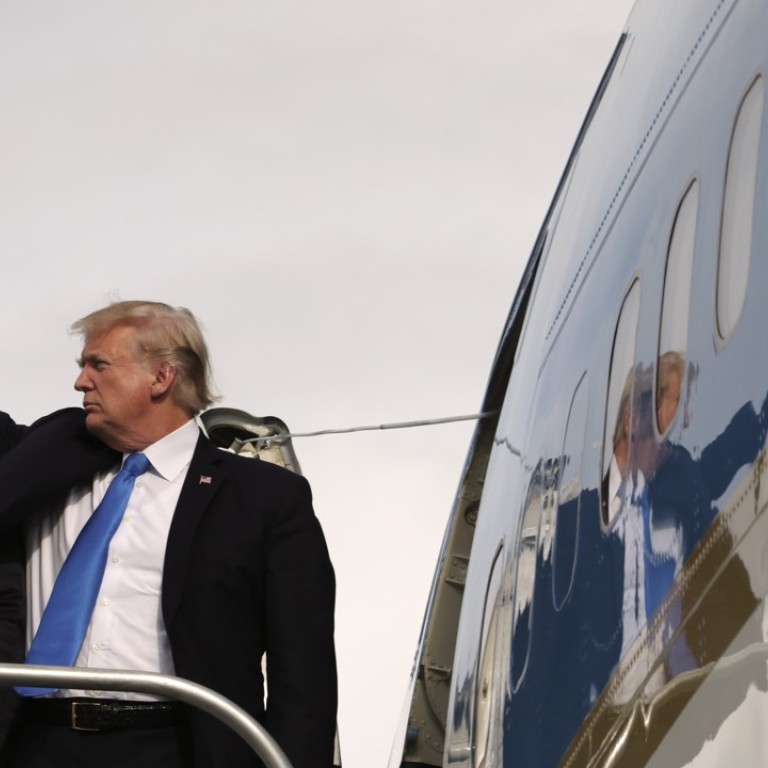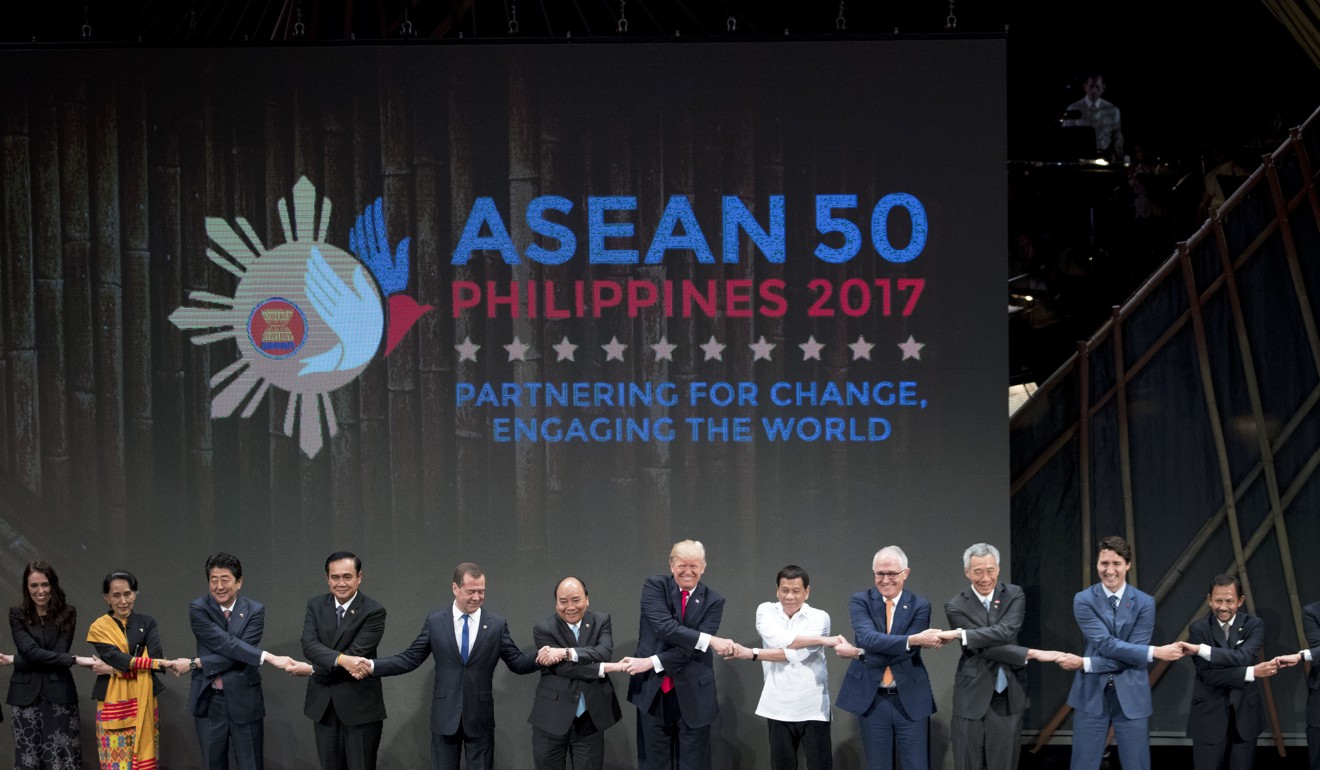
Rediscovering tolerance and kindness, after Trump-dominated Apec meeting
If there were ever an example of the xenophobic economic illiteracy of Trump’s zero-sum view of the world as a bundle of bilateral trade balances, Vietnam surely provides it
As I sat in Hanoi airport lounge last Thursday evening, waiting for a long-delayed Cathay Dragon flight home to Hong Kong and preparing myself for a very late night, an elderly but intrepid-looking American couple sat down next to me.
As can only happen with Americans, I within minutes knew their life story, all about their just-finished holiday through Indochina, all details of their grandchildren, and more than I would ever have cared to know about their home in Clearwater, Miami.
Did you know Clearwater is home to Hulk Hogan, by the way, Evel Knievel, Hooters founder Lynn Stewart, and the Church of Scientology?
I also quickly discovered – because the husband was wearing a virulent orange baseball-hat emblazoned with a green alligator – that they were both passionate Florida Gators fans.
This illustrious American football team, based at the University of Florida’s Ben Hill Griffin Stadium in Gainesville, has been on miserable form of late, I learned – hardly surprising in the age of Trump, since the popular name for Ben Hill Griffin Stadium is “the Swamp”. Not auspicious.

I ventured into the “Trump subject” with trepidation, because just as Brexit in the UK has torn families asunder, so has the past 12 months in American politics. These two were passionate Democrats, and once they knew I was British and not American, spared no adjectives to describe their stress over the past year.
Needless to say, I expressed some sympathy. In the past week I had witnessed a totally tin-eared Donald Trump on a podium at the Da Nang Asia-Pacific Economic Cooperation forum (Apec) leaders’ meeting hectoring the Vietnamese – and other Apec members – for having bilateral trade surpluses with the US, and providing vignettes about China’s long history of oppression and interference in the country.
Does he have no recollection of the rather recent US interference in Vietnam (the initial invasion in 1965 was on the nearby Da Nang beach if I remember correctly)?
Does he have no sensitivity to the inappropriateness of his “America first” message in a country that was almost bombed back into the stone age five decades ago, but which has used multilateral trade engagement with the outside world to pull itself back to be one of Asia’s most impressive liberalising role models?
Focus on what you can control. Be a good person every day. Vote. Read. Treat one another kindly. Follow the law. Don’t tweet nasty stuff
From joining Apec 1998, Vietnam’s GDP has grown from US$27 billion to US$202 billion – averaging growth of more than 6 per cent a year.
And yes, exports have surged almost 14-fold to US$177 billion last year, but imports have surged in similar measure, to US$174 billion, leaving merchandise trade-in almost perfect balance.
If there were ever an example of the xenophobic economic illiteracy of Trump’s zero-sum view of the world as a bundle of bilateral trade balances, Vietnam surely provides it.
Vietnam is a poster child for the net benefits of globalisation and commitment to free and open trade and investment. It would in normal times be applauded by the US for its willingness to open up and engage. But these are not normal times, and my newly acquired Florida Gator fans are not the only ones thrown into deep stress.
But before I started to get overemotional, I checked myself. That night – Thursday November 16 – was the UN International Day of Tolerance. And last Monday had been World Kindness Day.
So in this week of all weeks, I decided I should cut some slack. After all, in the UK in deference to Kindness Day, people handed out 10,000 free chocolate bars at London Train stations, in Singapore they handed out 30,000 flowers, and on Bondi Beach in Australia there had been an enormous “kindness hug”.

As for the International Day of Tolerance, created in 1996 to foster “mutual understanding among cultures and peoples”, the UN has just launched a new campaign to promote tolerance, respect and dignity across the world, and to work on reducing negative perceptions and attitudes (especially to refugees and migrants).
I don’t see tolerance or kindness among Trump’s strong suits, nor do I see him greatly appreciating my pause for thought, or making any particular mark in his diary to take note. But I checked myself anyway.
Perhaps I was influenced by former US first lady Michelle Obama, speaking at the Bushnell Center for the Performing Arts in Hartford, Connecticut, where she offered some interesting suggestions on how to survive chaotic times.
Her seven “survival rules” might give some comfort not just to those stressed Florida Gator fans, and the many other Americans feeling cut adrift by the past year’s events, but also to those of us on this side of the Pacific who feel an uncomfortable lack of control over our lives.
“Focus on what you can control,” Michelle Obama advised her audience: “Be a good person every day. Vote. Read. Treat one another kindly. Follow the law. Don’t tweet nasty stuff.”
She reminded me of the famous comment by the US theologian Reinhold Neibuhr: “God grant me the serenity to accept the things I cannot change, the courage to change the things I can, and the wisdom to know the difference.” It seems that such serenity, courage and wisdom are in strikingly short supply just now.
Her other observations may seem very “motherhood and pumpkin pie”, but in current stressful times must give pause for thought.
Something deep inside me tells wants me to believe that even Donald Trump wakes up every day believing he intends to be a good person. He just seems to have a problem with the Law of Unintended Consequences.
The imperative to vote is an interesting one, especially in places like Hong Kong, where opportunities for any meaningful votes are very limited. The bigger point is to remain concerned and engaged.
The imperative to read is doubly important in this age of wildcat social media and “false news”. We need to read not just to mine for truth, but also sometimes to escape and dream.
Her last three survival rules also make eminent good sense – even when we know the leader of the free world seems wilfully to ignore them.
So perhaps we should add a final eighth survival rule: Learn patience; bad things can and do get better.
David Dodwell research and writes about global, regional and Hong Kong challenges from a Hong Kong point of view

